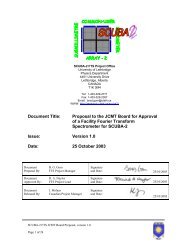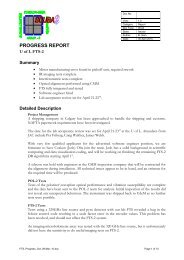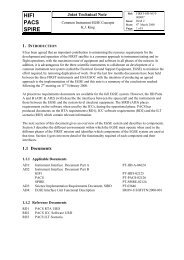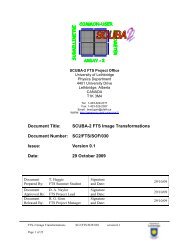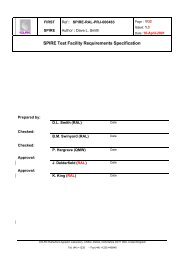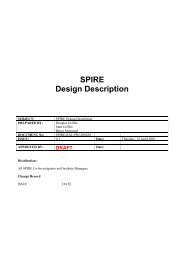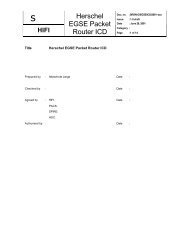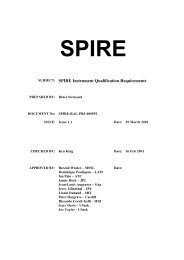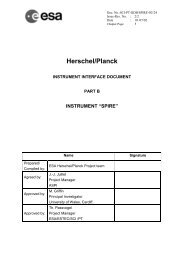gambling in alberta - Research Services - University of Lethbridge
gambling in alberta - Research Services - University of Lethbridge
gambling in alberta - Research Services - University of Lethbridge
Create successful ePaper yourself
Turn your PDF publications into a flip-book with our unique Google optimized e-Paper software.
1924 Crim<strong>in</strong>al Code amendment to s.986 to <strong>in</strong>dicate that an automated mach<strong>in</strong>e (‘slot mach<strong>in</strong>e’) that<br />
produces uncerta<strong>in</strong> outcomes is deemed to be a contrivance for play<strong>in</strong>g a game <strong>of</strong> chance and<br />
therefore the premises <strong>in</strong> which it is located is deemed to be an illegal common gam<strong>in</strong>g house.<br />
1927 Revised Crim<strong>in</strong>al Code<br />
Alberta enacts the ‘Slot Mach<strong>in</strong>e Act’ bann<strong>in</strong>g automated mach<strong>in</strong>es that provided potential<br />
monetary prizes or someth<strong>in</strong>g <strong>in</strong>tended to be exchanged for money, regardless <strong>of</strong> whether the<br />
mach<strong>in</strong>e also provided goods (e.g., gum) or services (e.g., music). (This latter condition was<br />
<strong>in</strong>tended to prohibit slot mach<strong>in</strong>es that tried to circumvent the law by also provid<strong>in</strong>g goods or<br />
services). The Slot Mach<strong>in</strong>e Act 1924<br />
Alberta prohibits the operation <strong>of</strong> any <strong>gambl<strong>in</strong>g</strong> device <strong>in</strong> areas where beer is licensed to be kept,<br />
sold, and consumed (alcohol prohibition <strong>in</strong> Alberta is repealed <strong>in</strong> this same year). Government<br />
Liquor Control Act <strong>of</strong> Alberta 1924<br />
1925 Alberta prohibits anyone under age 18 from visit<strong>in</strong>g any place where any <strong>gambl<strong>in</strong>g</strong> device exists.<br />
The Child Welfare Act 1925<br />
Crim<strong>in</strong>al Code amended (s.236) to allow ‘lottery schemes’ (<strong>in</strong>clud<strong>in</strong>g wheel <strong>of</strong> fortune) at<br />
agricultural fairs and exhibitions. 1927 Revised Crim<strong>in</strong>al Code<br />
1930s Gambl<strong>in</strong>g starts achiev<strong>in</strong>g a small degree <strong>of</strong> respectability due to a) b<strong>in</strong>go be<strong>in</strong>g regularly<br />
<strong>of</strong>fered by certa<strong>in</strong> religious and charitable groups; b) ‘<strong>gambl<strong>in</strong>g</strong>’ now be<strong>in</strong>g available <strong>in</strong> the<br />
form <strong>of</strong> various types <strong>of</strong> carnival games at midways at agricultural fairs and exhibitions (e.g.,<br />
wheel <strong>of</strong> fortune; target games <strong>in</strong>volv<strong>in</strong>g shoot<strong>in</strong>g or throw<strong>in</strong>g darts, co<strong>in</strong>s, balls or hoops);<br />
and the c) <strong>in</strong>creased overall participation <strong>in</strong> these religious/charitable/agricultural <strong>of</strong>fered<br />
forms <strong>of</strong> <strong>gambl<strong>in</strong>g</strong>, particularly by demographic groups that had relatively little previous<br />
<strong>in</strong>volvement (e.g., women). This greater tolerance led to several private bills be<strong>in</strong>g<br />
<strong>in</strong>troduced <strong>in</strong>to the House <strong>of</strong> Commons propos<strong>in</strong>g a legal lottery. However, these bills were<br />
defeated as there was still a strong sentiment that lotteries potentially underm<strong>in</strong>ed work<br />
ethic, as they were an attempt to get by chance what should be earned by hard work (a<br />
position supported by Protestant & Anglican churches, women’s groups, employers, and<br />
bus<strong>in</strong>ess owners (who felt that <strong>gambl<strong>in</strong>g</strong> diverted money from their bus<strong>in</strong>esses)).<br />
Horse race bett<strong>in</strong>g (both legal on-site and illegal <strong>of</strong>f-track) cont<strong>in</strong>ues its popularity. ‘Social<br />
clubs’ that provide opportunities to gamble between <strong>in</strong>dividuals (primarily on card games)<br />
are common. Although more discreet, illegal slot mach<strong>in</strong>es are <strong>in</strong>creas<strong>in</strong>gly common <strong>in</strong><br />
some locations, as are bookies to take sports bets and/or <strong>of</strong>f-track horse rac<strong>in</strong>g. Illegal<br />
sweepstakes and foreign lotteries more openly thrive (e.g., Irish Sweepstakes). Across<br />
Canada, organized crime becomes more <strong>in</strong>volved <strong>in</strong> provid<strong>in</strong>g illegal forms <strong>of</strong> <strong>gambl<strong>in</strong>g</strong><br />
(especially follow<strong>in</strong>g the repeal <strong>of</strong> alcohol prohibition, as alcohol provision had been an<br />
important source <strong>of</strong> revenue for organized crime).<br />
1938 Crim<strong>in</strong>al Code amended (s.168) to clarify that a place is not a ‘common gam<strong>in</strong>g house’ if:<br />
It is ‘occasionally’ used by charitable or religious groups and the proceeds from the games go to<br />
charitable or religious causes.<br />
It is used by a ‘bona fide social club’ and the owner <strong>of</strong> the establishment does not f<strong>in</strong>ancially ga<strong>in</strong><br />
from the <strong>gambl<strong>in</strong>g</strong> and if the fee for participat<strong>in</strong>g is less than 10 cents an hour or 50 cents a day.<br />
1940s Many trends from the 1930s cont<strong>in</strong>ue <strong>in</strong>to the 1940s. There is <strong>in</strong>creased availability <strong>of</strong> legal<br />
forms <strong>of</strong> <strong>gambl<strong>in</strong>g</strong> as well as participation <strong>in</strong> both legal and illegal forms. There is also<br />
cont<strong>in</strong>ued societal ambivalence about <strong>gambl<strong>in</strong>g</strong>, although polls show that most people<br />
favour a legal lottery.<br />
35



